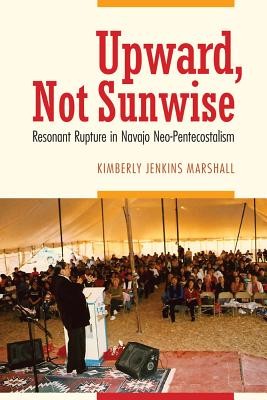
- We will send in 10–14 business days.
- Author: Kimberly Jenkins Marshall
- Publisher: University of Nebraska Press
- ISBN-10: 0803288883
- ISBN-13: 9780803288881
- Format: 15.2 x 22.9 x 1.6 cm, softcover
- Language: English
- SAVE -10% with code: EXTRA
Reviews
Description
Upward, Not Sunwise explores an influential and growing neo-Pentecostal movement among Native Americans characterized by evangelical Christian theology, charismatic "spirit-filled" worship, and decentralized Native control. As in other global contexts, neo-Pentecostalism is spread by charismatic evangelists practicing faith healing at tent revivals.In North America, this movement has become especially popular among the Diné (Navajo), where the Oodlánà ("Believers") movement now numbers nearly sixty thousand members. Participants in this movement value their Navajo cultural identity yet maintain a profound religious conviction that the beliefs of their ancestors are tools of the devil. Kimberly Jenkins Marshall has been researching the Oodlánà movement since 2006 and presents the first book-length study of Navajo neo-Pentecostalism. Key to the popularity of this movement is what the author calls "resonant rupture," or the way the apparent continuity of expressive forms holds appeal for Navajos, while believers simultaneously deny the continuity of these forms at the level of meaning. Although the music, dance, and poetic language at Oodlánà tent revivals is identifiably Navajo, Oodlánà carefully re-inscribe their country gospel music, dancing in the spirit, use of the Navajo language, and materials of faith healing as transformationally new and different. Marshall explores these and other nuances of Navajo neo-Pentecostal practices by examining how Oodlánà perform their faith under the big white tents scattered across the Navajo Nation. Kimberly Jenkins Marshall is an assistant professor of anthropology at the University of Oklahoma.
EXTRA 10 % discount with code: EXTRA
The promotion ends in 11d.01:09:13
The discount code is valid when purchasing from 10 €. Discounts do not stack.
- Author: Kimberly Jenkins Marshall
- Publisher: University of Nebraska Press
- ISBN-10: 0803288883
- ISBN-13: 9780803288881
- Format: 15.2 x 22.9 x 1.6 cm, softcover
- Language: English English
Upward, Not Sunwise explores an influential and growing neo-Pentecostal movement among Native Americans characterized by evangelical Christian theology, charismatic "spirit-filled" worship, and decentralized Native control. As in other global contexts, neo-Pentecostalism is spread by charismatic evangelists practicing faith healing at tent revivals.In North America, this movement has become especially popular among the Diné (Navajo), where the Oodlánà ("Believers") movement now numbers nearly sixty thousand members. Participants in this movement value their Navajo cultural identity yet maintain a profound religious conviction that the beliefs of their ancestors are tools of the devil. Kimberly Jenkins Marshall has been researching the Oodlánà movement since 2006 and presents the first book-length study of Navajo neo-Pentecostalism. Key to the popularity of this movement is what the author calls "resonant rupture," or the way the apparent continuity of expressive forms holds appeal for Navajos, while believers simultaneously deny the continuity of these forms at the level of meaning. Although the music, dance, and poetic language at Oodlánà tent revivals is identifiably Navajo, Oodlánà carefully re-inscribe their country gospel music, dancing in the spirit, use of the Navajo language, and materials of faith healing as transformationally new and different. Marshall explores these and other nuances of Navajo neo-Pentecostal practices by examining how Oodlánà perform their faith under the big white tents scattered across the Navajo Nation. Kimberly Jenkins Marshall is an assistant professor of anthropology at the University of Oklahoma.


Reviews